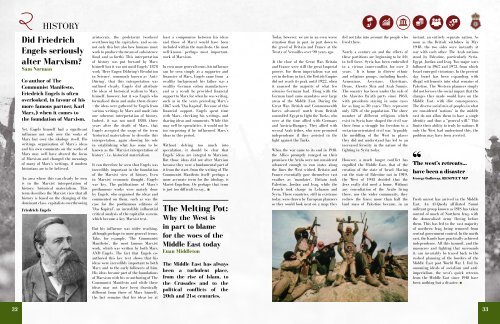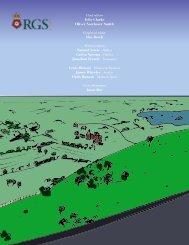The Future of Britain
Create successful ePaper yourself
Turn your PDF publications into a flip-book with our unique Google optimized e-Paper software.
HISTORY<br />
Did Friedrich<br />
Engels seriously<br />
alter Marxism?<br />
Sam Norman<br />
Co-author <strong>of</strong> <strong>The</strong><br />
Communist Manifesto,<br />
Friedrich Engels is <strong>of</strong>ten<br />
overlooked, in favour <strong>of</strong> his<br />
more famous partner, Karl<br />
Marx,) when it comes to<br />
the foundation <strong>of</strong> Marxism.<br />
Yet, Engels himself had a significant<br />
influence not only over the works <strong>of</strong><br />
Marx but over the ideology itself. His<br />
writings, organisation <strong>of</strong> Marx’s ideas<br />
and his own comments on the works <strong>of</strong><br />
Marx may well have altered the focus<br />
<strong>of</strong> Marxism and changed the meanings<br />
<strong>of</strong> many <strong>of</strong> Marx’s writings, if modern<br />
historians are to be believed.<br />
An area where this can clearly be seen<br />
is in the Marxist interpretation <strong>of</strong><br />
history: historical materialism. This<br />
term describes the Marxist view that all<br />
history is based on the changing <strong>of</strong> the<br />
dominant class- capitalists overthrowing<br />
Friedrich Engels<br />
aristocrats, the proletariat (workers)<br />
overthrowing the capitalists, and so onnot<br />
only this but also how humans must<br />
work to produce the means <strong>of</strong> subsistence<br />
(food and so forth). This interpretation<br />
<strong>of</strong> history was put forward by Marx<br />
himself but it was not until Engels’ 1878<br />
work ‘Herr Eugen Dühring’s Revolution<br />
in Science’, commonly known as ‘Anti-<br />
Düring’, that this interpretation was<br />
outlined clearly. Engels did attribute<br />
the ideas <strong>of</strong> historical realism to Marx<br />
himself, however, but it was Engels who<br />
formalised them and make them clearer<br />
– the ideas were gathered by Engels from<br />
various writings by Marx and made into<br />
one coherent interpretation <strong>of</strong> history.<br />
Indeed, it was not until 1880, three<br />
years after the death <strong>of</strong> Marx, that<br />
Engels accepted the usage <strong>of</strong> the term<br />
‘historical materialism’ to describe this<br />
interpretation, again showing his role<br />
in establishing what has come to be<br />
known as the ‘Marxist interpretation <strong>of</strong><br />
history’, i.e. historical materialism.<br />
It can therefore be seen that Engels was<br />
incredibly important in the foundation<br />
<strong>of</strong> the Marxist view <strong>of</strong> history. Even<br />
in Marxist economic thought, Engels<br />
was key. <strong>The</strong> publications <strong>of</strong> Marx’s<br />
posthumous works were mainly done<br />
by Engels, who organised the ideas and<br />
commented on them, such as was the<br />
case for the posthumous editions <strong>of</strong><br />
‘Das Kapital’, an incredibly influential<br />
critical analysis <strong>of</strong> the capitalist system,<br />
which became a key Marxist text.<br />
But his influence was wider reaching,<br />
although perhaps in more general terms.<br />
Take, for example, ‘<strong>The</strong> Communist<br />
Manifesto’, the most famous Marxist<br />
work, which was written by both Marx<br />
AND Engels. <strong>The</strong> fact that Engels coauthored<br />
this key text shows that his<br />
ideas were incredibly important to both<br />
Marx and to the early followers <strong>of</strong> him.<br />
His ideas became part <strong>of</strong> the foundations<br />
<strong>of</strong> Marxism with his co-authoring <strong>of</strong> <strong>The</strong><br />
Communist Manifesto and while these<br />
ideas may not have been drastically<br />
different from those <strong>of</strong> Marx himself,<br />
the fact remains that his ideas (or at<br />
least a compromise between his ideas<br />
and those <strong>of</strong> Marx) would have been<br />
included within the manifesto, the most<br />
well-known, perhaps most important,<br />
work <strong>of</strong> Marxism.<br />
In even more general terms, his influence<br />
can be seen simply as a supporter and<br />
financier <strong>of</strong> Marx. Engels came from a<br />
wealthy background- his father was a<br />
wealthy German cotton manufacturerand<br />
as a result he provided financial<br />
support to Marx for when he was writing,<br />
such as in the years preceding Marx’s<br />
1867 work ‘Das Kapital’. Because <strong>of</strong> this<br />
financial support, Engels spent time<br />
with Marx, checking his writings, and<br />
sharing ideas and comments. While this<br />
may well be speculative, it would not be<br />
too surprising if he influenced Marx’s<br />
ideas in this period.<br />
Without delving too much into<br />
speculation, it should be clear that<br />
Engels’ ideas are integral to Marxism.<br />
But those ideas did not alter Marxism<br />
because they were a fundamental part <strong>of</strong><br />
it from the start, from the writing <strong>of</strong> <strong>The</strong><br />
Communist Manifesto itself- perhaps a<br />
more accurate term for the ideology is<br />
Marist-Engelism. Or perhaps that term<br />
is just too difficult to say... ƒ<br />
<strong>The</strong> Melting Pot:<br />
Why the West is<br />
in part to blame<br />
for the woes <strong>of</strong> the<br />
Middle East today<br />
Euan Middleton<br />
<strong>The</strong> Middle East has always<br />
been a turbulent place,<br />
from the rise <strong>of</strong> Islam, to<br />
the Crusades and to the<br />
political conflicts <strong>of</strong> the<br />
20th and 21st centuries.<br />
Today, however, we are in an even worse<br />
situation than in past, in part down to<br />
the greed <strong>of</strong> <strong>Britain</strong> and France at the<br />
Treaty <strong>of</strong> Versailles over 90 years ago.<br />
At the close <strong>of</strong> the Great War, <strong>Britain</strong><br />
and France were still the great Imperial<br />
powers. For them imperialism was not<br />
yet in decline; in fact, the British Empire<br />
did not reach its peak until 1922, when<br />
it annexed the majority <strong>of</strong> what few<br />
colonies Germany had. Along with the<br />
German land came mandates over large<br />
areas <strong>of</strong> the Middle East. During the<br />
Great War, British and Commonwealth<br />
forces advanced north from British<br />
controlled Egypt to fight the Turks, who<br />
were at the time allied with Germany<br />
and Austria-Hungary. <strong>The</strong>y allied with<br />
several Arab tribes, who were promised<br />
independence if they assisted in the<br />
fight against the Turks.<br />
When the war came to its end in 1918,<br />
the Allies promptly reneged on their<br />
promises; the Arabs were not considered<br />
advanced enough to run states along<br />
the lines the West wished. <strong>Britain</strong> and<br />
France essentially gave themselves vast<br />
swathes as ‘mandates’. <strong>Britain</strong> took<br />
Palestine, Jordan and Iraq, while the<br />
French took charge in Lebanon and<br />
Syria. <strong>The</strong>se countries, still in existence<br />
today, were drawn by European planners<br />
so they would look neat on a map; they<br />
did not take into account the people who<br />
lived there.<br />
Nearly a century on and the effects <strong>of</strong><br />
these partitions are beginning to be felt<br />
in full force. Syria has been embroiled<br />
in a vicious inner-conflict for over 3<br />
years. It is home to diverse ethnic<br />
and religious groups, including Kurds,<br />
Armenians, Assyrians, Christians,<br />
Druze, Alawite Shia and Arab Sunnis.<br />
<strong>The</strong> country has been under the rule <strong>of</strong><br />
the Alawites Ba’ath party since 1963,<br />
with presidents staying in some cases<br />
for as long as 30 years. <strong>The</strong>y represent<br />
only 12% <strong>of</strong> the population. <strong>The</strong> sheer<br />
number <strong>of</strong> different religions which<br />
exist in Syria have shaped the civil war<br />
there from a struggle for freedom to a<br />
sectarian-orientated civil war. Arguably<br />
the meddling <strong>of</strong> the West in places<br />
they did not understand has led to an<br />
increased ferocity in the nature <strong>of</strong> the<br />
fighting in Syria today.<br />
However, a much longer conflict has<br />
engulfed the Middle East, that <strong>of</strong> the<br />
creation <strong>of</strong> the state <strong>of</strong> Israel. Having<br />
cut the state <strong>of</strong> Palestine out in 1919,<br />
the West <strong>of</strong> 1945 decided that the<br />
Jews really did need a home. Without<br />
any consultation <strong>of</strong> the Arabs living<br />
there, nor the wider community, they<br />
redrew the lines; more than half the<br />
land mass <strong>of</strong> Palestine became, in an<br />
instant, an entirely separate nation. As<br />
soon as the British withdrew in May<br />
1948, the two sides were instantly at<br />
war with each other. <strong>The</strong> Arab nations<br />
stood by Palestine, particularly Syria,<br />
Egypt, Jordan and Iraq. Two major wars<br />
followed in 1967 and 1973, from which<br />
Israel emerged victorious. In the present<br />
day Israel has been expanding with<br />
illegal settlements into what remains <strong>of</strong><br />
Palestine. <strong>The</strong> Western planners simply<br />
did not foresee the social impact that the<br />
changes they made would have on the<br />
Middle East, with dire consequences.<br />
<strong>The</strong> diverse social mix <strong>of</strong> peoples in what<br />
are considered ‘nations’ in the middle<br />
east do not allow them to have a single<br />
identity and thus a “general will.” This<br />
limits their ability to truly be nations. If<br />
only the West had understood this, the<br />
problem may have been averted.<br />
“<strong>The</strong> west’s retreats...<br />
have been a disaster<br />
George Galloway, RESPECT MP<br />
Fresh unrest has arrived in the Middle<br />
East. An Al-Qaeda affiliated Sunni<br />
militant group known as ISIS has taken<br />
control <strong>of</strong> much <strong>of</strong> Northern Iraq, with<br />
the demoralised army fleeing before<br />
them. This has led to the vast majority<br />
<strong>of</strong> northern Iraq being removed from<br />
central government control. In the north<br />
east, the Kurds have practically achieved<br />
independence. All this turmoil, and the<br />
massacres and fighting that surrounds<br />
it, can invariably be traced back to the<br />
rushed planning <strong>of</strong> the borders <strong>of</strong> the<br />
Middle East post World War I. Fed by<br />
oncoming ideals <strong>of</strong> socialism and antiimperialism,<br />
the west’s quick retreats<br />
from the Middle East since 1918 have<br />
been nothing but a disaster. ƒ<br />
32<br />
33




